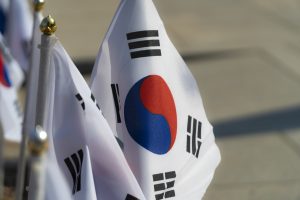South Korean President Yoon Suk-yeol is traveling through Central Asia this week, after touching down in Ashgabat, Turkmenistan on June 10. He is scheduled to visit Astana, Kazakhstan on June 11-13 and finish up his trip with stops in Tashkent and Samarkand, in Uzbekistan, on June 13-15.
As The Korea Herald reported ahead of the trip, Kim Tae-hyo, first deputy director of the presidential National Security Office, told reporters that South Korea seeks to integrate its innovation prowess with the economic development potential in Central Asia, “based on strong trust and solidarity.” Energy, technology, and manufacturing are expected to be a major themes, as these are areas where South Korea and Central Asian countries see significant synergies in expertise and resources.
But Seoul is also promoting what it calls the “K-Silk Road Cooperation” initiative. The Korea Herald described it as an attempt to find “a blueprint for multilateral relationship building in the region home to hundreds of thousands of members of the Korean diaspora,” noting Korean efforts in both the Pacific and Africa in the same vein.
Yoon’s office also announced plans for a six-way summit – a C5+1, South Korean-style – to launch in 2025 with a meeting in South Korea. In this, Seoul follows a well-worn path of grouping summits with Central Asian leaders (or foreign ministers) together. For outside powers, this regional approach optimizes leaders’ time and resources while also encouraging regional cooperation.
The South Korean president’s trip mirrors those of his predecessors. Yoon’s direct predecessor, Moon Jae-in, spent eight days in 2019 traveling across Central Asia. He also visited Turkmenistan, Uzbekistan, and Kazakhstan. Moon’s predecessor, Park Geun-hye, made a six-day sojourn to Central Asia in 2014, visiting – you guessed it – Uzbekistan, Kazakhstan, and Turkmenistan. And Lee Myung-bak, Park’s predecessor, visited Kazakhstan and Uzbekistan in 2009.
Over the last decade, despite presidential changes across the board the crux of South Korea-Central Asia relations remains energy and associated businesses, like petrochemical plants.
The outcomes of Park’s 2014 trip noted hopes for a gas development project and a solar power plant in Uzbekistan, but it does not appear that either project went to South Korean companies in the end. By the time of Moon’s 2019 visit to the country – where he met relatively new Uzbek President Shavkat Mirziyoyev – the two sides upgraded ties to a “special strategic partnership,” and Moon waxed poetic about hopes that one day the two countries would one day be connected by rail. (At the time, part of Moon’s approach to inter-Korean rapprochement included grand plans for a rail line connecting the two Koreas. Given that South Korea is on the tip of the Korean Peninsula, a rail connection to Uzbekistan is impossible without North Korean participation). Uzbekistan and South Korea also stressed in 2019 that they were working on a a Korea-Uzbekistan FTA (as of 2021 they were still working on it.) As I noted in earlier reporting, migration to Korea is of particular interest to Tashkent, which is seeking additional outlets for its working population — we can expect this on the agenda.
In Kazakhstan, Korea has had somewhat better luck. The Balkhash Thermal Power Plant, a coal-fired power plant first agreed to under Lee in 2011 under a 25-year build, own, operate, and transfer mechanism involving Samsung as a major sponsor, began construction in 2012. In 2014, the two sides signed a contract for Kazakhstan to pay $18.8 billion to buy all of the electricity generated at the plant. In 2019, Moon’s visit came just over a month after Nursultan Nazarbayev’s surprise resignation. He met with then-interim President Kassym-Jomart Tokayev but also with Nazarbayev. This time around, it’s a good bet that Yoon won’t have a separate meeting with Nazarbayev.
Turkmenistan was added to the Central Asia itinerary of South Korean presidents in 2014, with Park signing two memorandums of understanding on the construction of a gas-chemical plant in the Seydi District of Lebap Province and a petrochemical refinery converting natural gas to liquid fuels such as kerosene and diesel. By 2019, the petrochemical plant – the state-owned Kiyanly Polymer Plant – had been completed by a constellation of Korean and Japanese companies, with Korean and Japanese funding. Unfortunately, according to The Korea Herald the plant ceased operations in 2023.
In Turkmenistan, Yoon met with President Serdar Berdimuhamedov but also with his father, former president and current People’s Council of Turkmenistan Chair Gurbanguly Berdimuhamedov. Korean media have reported a number of agreements signed including a Trade and Investment Promotion Framework; a framework agreement between Hyundai Engineering and state-run Turkmengas for a desulfurization facility at the Galkynysh gas field; and Hyundai Engineering signed a cooperation agreement to resume operations at Kiyanly. Korean companies are also reportedly bidding for other projects in Turkmenistan, including an ammonia fertilizer production plant, also in Kiyanly.
With the past trips of South Korean presidents as a guide, and the outcomes of Yoon’s already completed stop in Ashgabat as confirmation, we can expect to see further agreements and frameworks in energy and chemicals in particular, as well as a sprinkling of other areas. While diplomatic fads and initiative titles come and go, South Korea remains interested in deepening engagement with Central Asia, even if that engagement tends to slide onto predictable tracks. Seoul its among a tier of middle-power partners, such as Japan, which are rather innocuous in Central Asia, drawing neither sharp criticism locally nor overly irritating major regional players like China and Russia, despite the fact that both South Korea and Japan are U.S. allies.

































